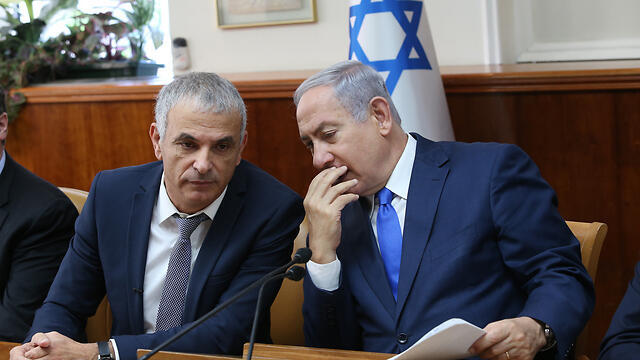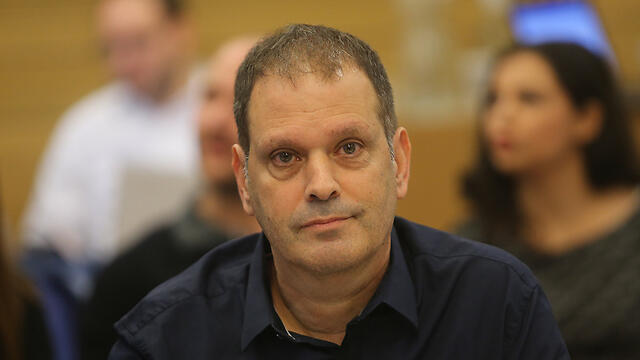Getting your Trinity Audio player ready...
The deadline for Israel to transfer a 12 million euro guarantee payment to the European Broadcast Union (EBU) so it could host the 2019 Eurovision Song Contest arrived Tuesday with the government and Israel Public Broadcasting Corporation (IPBC) still in locked-horns over who would bear the cost .
Finance Ministry officials said Monday night they had no intention of compromising on the matter, adding the IPBC must resolve the issue themselves.
"Any other move on their part will be perceived as political and unprofessional," a senior government official said.
Throughout the day Monday, IPBC officials held talks with Finance Ministry representatives in an effort to convince the Treasury to unconditionally back the IPBC in case the 12 million euro guarantee is impounded.
The Finance Ministry, however, refuses to make such a commitment and blames the IPBC of unnecessarily politicizing the matter. "Someone at the IPBC has climbed a tall tree," a senior government official said. "Throughout the day, it appeared they were looking for a ladder to get down, but the Prime Minister's Office and the Finance Ministry have no intention of providing that ladder to them."
Most government ministers back Prime Minister Benjamin Netanyahu and Finance Minister Moshe Kahlon's position.
Kahlon told Ynet on Monday that the IPBC would be making a “grave mistake” if it gives up hosting the Eurovision in Israel, insisting the matter was entirely up to the IPBC.
"They are able to transfer the sum in a minute," Kahlon said. "The IPBC is a government body, it is financed by the taxpayers' money and it has to operate according to the rules and regulations. I almost went to early elections to ensure the IPBC goes live, so for them to say it's political doesn't make any sense. The only politicians here are the IPBC officials."
The production cost of the Eurovision in Israel is estimated at 35 million euro, and the IPBC was supposed to transfer the guarantee to the EBU by August 1.
The EBU has agreed to give the IPBC an extension until August 14, but the issue of where the money will come from has not yet been resolved.
Israel won the 2018 Eurovision Song Contest with Netta Barzilai's "Toy," granting it the right to host next year's competition.
But despite his enthusiasm over the win, the prime minister refuses to allocate a budget for the competition, arguing the money should come from the IPBC's annual budget.
The IPBC, meanwhile, claims it would not be able to take the money out of its own budget unless it fires 200 employees or cuts down on original productions.
On Sunday, the IPBC heads sent a letter to Netanyahu and Kahlon, warning them that if the Finance Ministry doesn't commit to help the IPBC with the guarantee payment, they will renounce the right to host the Eurovision in Israel.
In an official statement, the EBU said Monday it had alternative plans for next year's Eurovision should Israel be unable to meet its obligations.
"The European Broadcast Union works closely with the IPBC ahead of the deadline to advance the necessary procedures ahead of the Eurovision competition next year in Israel," the EBU said. "Every year, the financial guarantees must be transferred to the European Broadcast Union even before work begins on the competition and the announcement of the host city. If a public broadcasting union cannot meet the entry requirements, we have alternative plans, just like any other major event being planned with many international parties."
According to Israeli officials involved in the Eurovision production, the alternative means hosting the competition in the second-place finisher, Cyprus, which will not be able to finance the event, and so Austria will likely get to host as the third-place finisher.
Meanwhile, Tel Aviv Mayor Ron Huldai has offered to help fund the Eurovision. "Once again, there is no responsible adult. Just like they chased (Argentine soccer star) Messi from Israel, now they're chasing the Eurovision away," Huldai lamented in a Facebook post.
"The event, which is broadcast to billions around the world (and it doesn't matter which city hosts it), will give exposure to the beautiful Israel many in the world don't know. The Tel Aviv municipality is willing to contribute to the national effort by covering the costs for the venue—a main expense in organizing the event," he went on to say.
"Perhaps this would help those who are once again climbing trees instead of finding solutions."
This would not be the first time Israel renounces the right to host the Eurovision Song Content. In 1980, after Israel won the competition with the song "Hallelujah," Israel could not host the competition due to financial issues the Israel Broadcasting Authority (IBA) was experiencing at the time. Furthermore, the date set for the Eurovision fell on Israel's Memorial Day for IDF soldiers, leading the government to decide not to participate in the competition at all.




